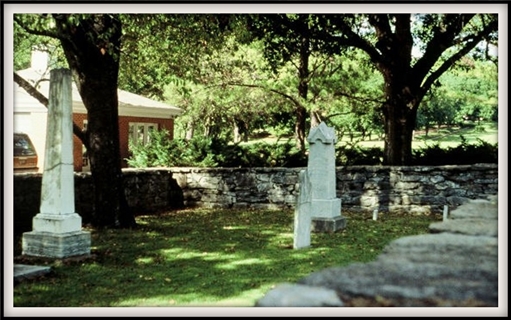

|
a perpetual record of yesterday and sanctuary of peace and quiet today. A cemetery exists because life is worth loving and remembering - always." ... Unknown |
|
Foot marker reads "Elizabeth SHORTRIDGE 1817-1905 SHORTRIDGE, Geo., Died 29 July 1870, “Aged 55 years” KING, Mrs. Susan D., “Here lies the remains of Mrs. Susan D. KING, second wife of Edmund KING, and daughter of Joshua and Sylvia WARD. She was born in Bertie County, N. Carolina and died June 22nd 1850, in the 34th year of her age." SHORTRIDGE, Eli, “Killed at Battle of Seven Pines, Va. 30 June 1862, Aged 18 years." "He died for the southland he loved so well” SHORTRIDGE, Frank Forrester, “Killed at Battle Atlanta, Ga. ~ 24 August 1864 "Almight example of Southern Chivalry” KING, Frank Ragan, 10 March 1840, 8 October 1884 KING, Mrs. Nancy, “Consort of Edmund KING. Age at death: 49” ~ 10 September 1842 KING, Morgan "Our Darling Morgan KING" Infant Son of Frank R. & Fannie V. KING”, 15 April 1882, 6 October 1884 KING, Lyttleton, "Sacred to the Memory of Lyttleton KING he was accidentally killed by his brother in shooting at a deer in September 1848 in the 21st year of his age" CLICK HERE TO READ THE MELANCHOLY SURROUNDING HIS DEATH KING, Nathan Ragan, 1831-1863 SHORTRIDGE, George D., Jr., 23 July 1837, 29 August 1868 "A Wife's Tribute" KING, Edmund, "Born in Va, removed to Ga and married Nancy RAGAN in 1812. Came to Ala in 1817 and settled on this place where he died 28 June 1863 in the 82 year of his age." (Marker broken) "He was a wise and just man, a kind neighbor,a patriotic citizen and was more than fifty years an earnest and consistent member of the Baptist Church." |